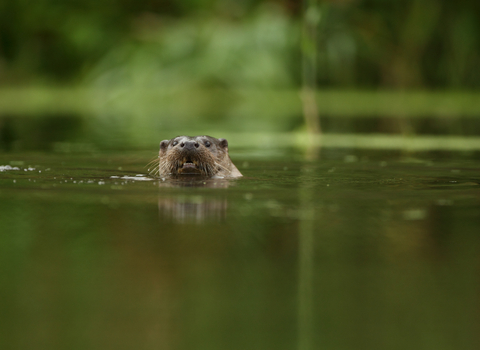Our chalk streams and local seas are unique, special, and home to incredible species.
Over 85% of all chalk streams in the world are found in the South of England, truly one of the rarest habitats on the planet. They are the perfect habitat for iconic British species like water vole, southern chalk stream Atlantic salmon, brown trout, southern damselfly, and white-clawed crayfish. Further downstream, the Solent is unique boasting breathtaking coastlines, expansive seagrass meadows, and intricate chalk reefs. It's also a home for captivating creatures such as seahorses, thresher sharks, and cuttlefish.
These habitats should be our ‘crown jewels’ , and something local people take pride in However, our local waters are significantly threatened by pollution, climate change, damage to habitats and pressures of industrial and recreational demands. Langstone Harbour, a site of scientific interest, in Havant is one of the worst places in the UK for sewage impacts. In the first 3 months of 2024 there were over 400 pollution alerts which was more than the whole of 2023. Even our most protected chalk streams like the Test and the Itchen are being poisoned. This year, the Environment Agency reported pollution events into the Site of Special Scientific Interest which were significant enough that they would be hazardous to human health.
The solutions exist, but they need more support in policy. For instance, we need stronger legal protections for our chalk streams - to recognise their specific challenges, tackle pollution, and stop damaging activities.
What needs to change?
-
Save Our Chalk Streams - Many of our members and supporters have already written to their MPs demanding for better protections for chalk streams. Currently only 11 out of the 220 British chalk streams have any legal protections as a Site of Special Scientific Interest (SSSI) and only 4 are protected as Special Areas of Conservation (SAC). Strong legal protections are needed for all chalk streams. These must require water companies to urgently invest in waste-water infrastructure where it is currently failing , support positive outcomes for chalk streams through mechanisms such as Biodiversity Net Gain, prevents over abstraction and require green buffers to protect our streams better from development and agricultural pollution pressures.
-
Enforce the law - Cuts to enforcement agencies and environmental protection budgets over the past decade have left our rivers defenceless against polluters. Environmental watchdogs must be empowered and sufficiently resourced to ensure they can monitor and inspect polluters and enforce penalties upon those who break the law.
-
Halve nutrient pollution by 2030 - Sewage, wastewater and agriculture are all suffocating our rivers and the wildlife that depends on them. The public rightly want to see heathy, safe and clean rivers, lakes, wetlands and coasts. Nature can be part of the solution, for example, by enabling more rainwater to be retained naturally, rather than overwhelming the sewage system or by rewilding previously polluting agricultural land, as we have proven to be effective through our Solent nitrate reduction scheme.
-
Stop damage to Marine Protected Areas - The UK’s seas are being poisoned by sewage discharges and river pollution is draining into them on a daily basis. Even our protected areas at sea are being damaged by unsustainable development and destructive fishing methods such as bottom trawling. It must stop. Our Marine Protected Areas should be properly managed – with destructive practices banned and development avoided.

